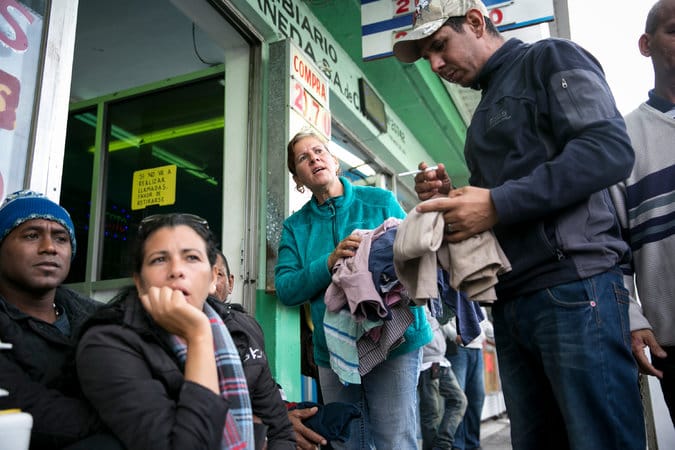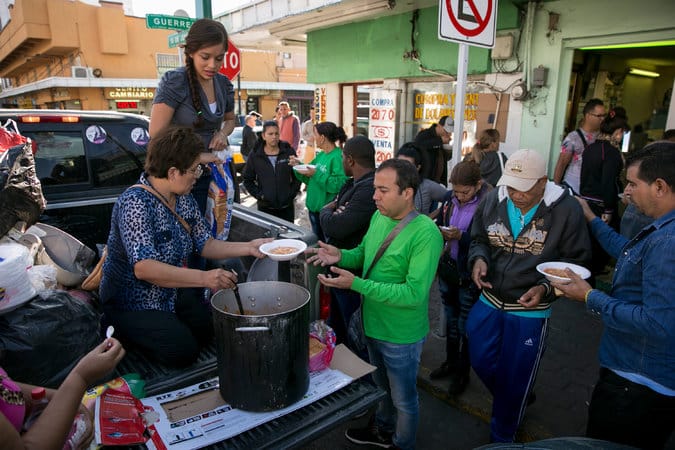
Cubans Newly Blocked at U.S. Border Place Hopes in Trump
 Yamila González Cabeza, 44, center, helped to organize clothes donated for fellow Cubans stuck at the border. Credit Ilana Panich-Linsman for The New York Times
Yamila González Cabeza, 44, center, helped to organize clothes donated for fellow Cubans stuck at the border. Credit Ilana Panich-Linsman for The New York Times
NUEVO LAREDO, Mexico — She spent weeks hiking through the Amazon, crossing a crocodile-filled river. She scaled border walls, escaped from immigration detention in Panama and slept in a church. Broke, hungry and exhausted, she found refuge with indigenous people in the jungle who took her in and fed her for a week.
Finally, six months after fleeing Cuba on a tortuous journey to the United States, Marleni Barbier, a dental assistant from Havana, made it to the border with Texas — about 12 hours too late.
More than 1,000 Cuban migrants who endured monthslong treks across as many as 10 countries to reach the United States are marooned in Mexico, halted by the Obama administration’s decision this month to end special immigration privileges for Cubans who make it to the American border.
The abrupt change is a profound one for Cubans, who fled their country by the tens of thousands in the last year to take advantage of a decades-old policy that permitted them to enter the United States.
Now, the many Cubans stranded in Mexico — and potentially thousands more plodding up the migrant trail through the Americas — are hoping for a reprieve: that President Trump, who was elected on a promise to build a wall along the Mexican border, will let them through.
“I have faith that Trump will change it,” said Ms. Barbier, 44, who arrived at the Texas border right after President Barack Obama announced the end of special rights for Cubans. “To take away a law at the last minute like that, it’s so unjust.”
Some of the Cubans stuck in limbo here at the Texas border arrived on Jan. 12, the same day the Obama administration eliminated the so-called wet foot, dry foot rule. The rule, which dated to 1995, allowed Cubans who reached the United States to enter the country.
About 150 Cubans are parked only 50 steps from the pedestrian bridge that connects Nuevo Laredo, in Mexico, to Laredo, Texas. Bewildered and deflated, they are being fed by Mexican strangers, and they pray.
“Everybody was racing to get here before the inauguration on the 20th,” said Yamila González Cabeza, 44, a teacher from Cuba, saying many migrants thought the Trump administration would be the one to shut the border. “The reverse was true. We did not expect this surprise on the 12th.”
The Cuban government has long abhorred the special immigration privileges, saying the policy bleeds the island of its citizens and lures waves of migrants into dangerous journeys by land and sea.
In striking down the rule, Mr. Obama said it was “designed for a different era” during a period of hostilities before the United States restored diplomatic relations with the Cuban government. By taking away their privilege to enter, Mr. Obama said, the United States would treat Cuban migrants “the same way we treat migrants from other countries.”
That decision could now put Mr. Trump in an awkward position: He campaigned on an anti-immigration platform, vowing not to let migrants slip through American borders. But he has also threatened to overturn Mr. Obama’s executive orders and get tough on the Cuban government.
Mr. Trump has in the past said the wet foot, dry foot policy, which sent back Cubans caught at sea but allowed those who reached land to enter, was unfair. Still, the Cubans here hope he will show humanitarian compassion for people who undertook arduous voyages to escape Communism and extreme poverty.
Ms. Barbier said she had spent all of the $8,000 she made from the sale of her house in Cuba to make it this far. “That money is gone, gone, gone,” she said.
About 41,000 Cubans made similar trips across the Americas last year. But because she got to the border a little too late, Ms. Barbier and other Cubans like her may be sent back unless they can prove they endured individual persecution, not just poverty or lack of opportunity, on the island.
“I certainly have sympathy for them, but the policy has been changed, and the moment they changed it, the policy was eliminated,” said Representative Henry Cuellar, a Democrat who represents Laredo. “They didn’t say anyone in the pipeline can come in. By luck, some got in and some did not.”
Eliannes Matos Salazar, 32, said she had been at the border station here all day on Jan. 12, and had already been photographed and fingerprinted, when she was forced to leave after the announcement. Yet her husband got through and is now in Las Vegas, she said.
“They can check their surveillance camera footage, because they will see me on it,” said Ms. Matos, who came from Guantánamo, the Cuban city where the American naval base is.
Alberto Ramírez Balmaseda said he had turned back because border agents told him that he would face long periods of incarceration for a chance at presenting proof of persecution to a judge.
Cecilia Zamudio, 42, and her daughter Maeli Roman, 23, who are Mexican, cooked a large pot of soup to serve to the Cubans waiting on the street. Credit Ilana Panich-Linsman for The New York Times
“What evidence do we have? That there’s been a Castro regime in power for about 60 years?” Mr. Ramírez said. “If you are a political prisoner in Cuba, they don’t put ‘political prisoner’ on your criminal record. They say you stole a pig.”
Several of the Cubans interviewed said that even if they had not had political problems before they left, they would if they were sent back.
Yenier Echevarría González, 31, who worked as a baker in the tourism industry, said state security agents had seen a photo he posted from Brazil on Facebook, so they showed up at his house in Cuba and demanded that his wife sign his employment resignation papers. He had been gone just a week and had not officially emigrated.
“First of all, if I’m deported I will probably have to serve two months in jail,” Mr. Echevarría said. “And I will never again have a job, a car or a house — ever.”
The Cuban government promised in the 1995 migration accords with Washington not to retaliate against Cubans who were turned back, said Holly Ackerman, a Duke University librarian who studies Cuban migration. To qualify for residency in the United States, Cubans will now have to show they would be personally persecuted back home.
